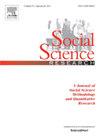Aggressive behavior and social Status: An experimental test of the general aggression model
IF 3.5
2区 社会学
Q1 SOCIOLOGY
引用次数: 0
Abstract
In everyday situations, violations of social norms can be perceived as provocations that trigger aggression, which can have negative consequences for the individuals involved and social coexistence. Based on the General Aggression Model (GAM), we investigate how a physical provocation affects the internal state (cognition, arousal, and affect) of the provoked person and how this then affects their potential reactions. We also investigate the moderating effect of the provocateur's social status in this process. Using a scenario-based experiment within a representative sample of the working population in Germany (N = 1,595), the level of provocation and the social status of the provocateur were experimentally manipulated, whereby three indicators of the internal state and three possible reactions (no reaction, verbal aggression, and physical aggression) were measured. Results show that an intentional provocation reduces the likelihood that the provocation will be ignored, while verbal or aggressive reactions become more likely. These effects were mediated by the provoked person's internal state. A higher social status of the provocateur resulted in a more aggressive-prone internal state. Moreover, the verbal reaction to provocation was significantly less affected by the internal state when the provocateur was of high social status. However, a simultaneous analysis of these processes shows that these countervailing conditioning effects of the social status offset the overall impact. This study offers insights into the dynamics of social interactions by demonstrating the functioning of a mechanism between provocation in everyday situations and the provoked individual's reactions, as well as the role of the provocateur's social status.
攻击行为与社会地位:一般攻击模型的实验检验
在日常情况下,违反社会规范可被视为引发侵略的挑衅行为,这可能对所涉个人和社会共存产生负面后果。基于一般攻击模型(GAM),我们研究了身体挑衅如何影响被挑衅者的内部状态(认知、觉醒和情感),以及这如何影响他们的潜在反应。我们还研究了挑衅者社会地位在这一过程中的调节作用。采用基于场景的实验方法,选取德国1595名具有代表性的工作人群为样本,对挑衅者的挑衅水平和社会地位进行实验操纵,测量了内部状态的三个指标和三种可能的反应(无反应、言语攻击和身体攻击)。结果表明,故意挑衅降低了挑衅被忽视的可能性,而言语或攻击性反应变得更有可能。这些影响是由被激怒的人的内部状态调节的。挑衅者的社会地位越高,其内部状态就越具有攻击性。此外,当挑衅者的社会地位较高时,言语反应受内部状态的影响显著降低。然而,对这些过程的同时分析表明,社会地位的这些抵消性条件作用抵消了总体影响。本研究通过展示日常情境中的挑衅与被挑衅个体的反应之间的机制的功能,以及挑衅者的社会地位的作用,为社会互动的动态提供了见解。
本文章由计算机程序翻译,如有差异,请以英文原文为准。
求助全文
约1分钟内获得全文
求助全文
来源期刊

Social Science Research
SOCIOLOGY-
CiteScore
4.30
自引率
4.00%
发文量
0
审稿时长
65 days
期刊介绍:
Social Science Research publishes papers devoted to quantitative social science research and methodology. The journal features articles that illustrate the use of quantitative methods in the empirical solution of substantive problems, and emphasizes those concerned with issues or methods that cut across traditional disciplinary lines. Special attention is given to methods that have been used by only one particular social science discipline, but that may have application to a broader range of areas.
 求助内容:
求助内容: 应助结果提醒方式:
应助结果提醒方式:


